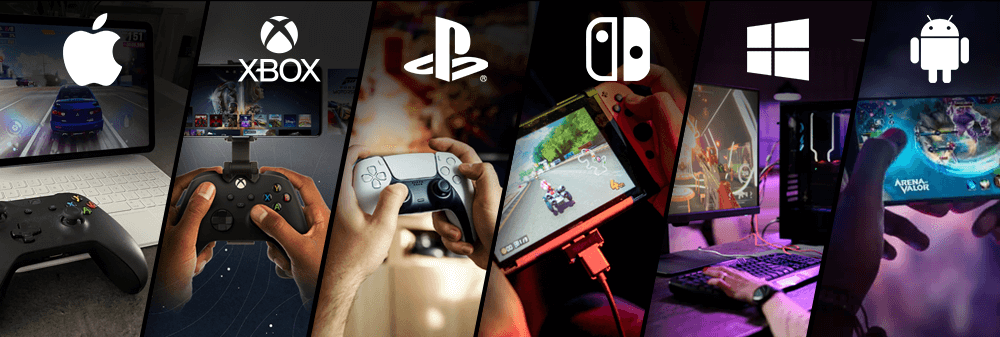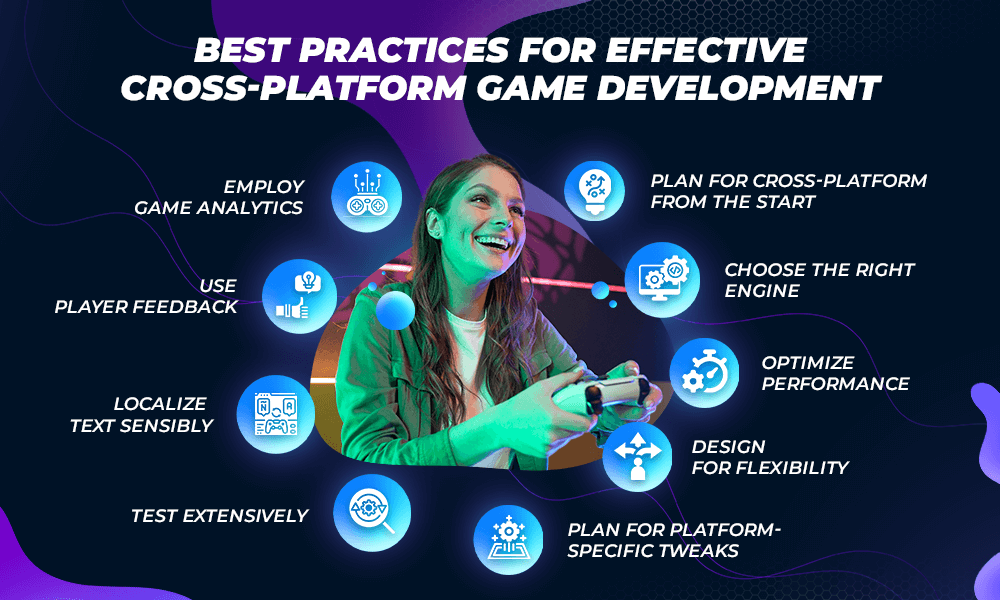A varied array of platforms is today available to gamers, posing exciting opportunities and serious challengers for developers. This led to the need for innovation, experimentation, and redefinition of game play. Game developers began implementing cross-platform play, creating a revolution in the gaming landscape.
Cross-platform play enables gamers to break barriers and foster inclusion in the gaming community, as they no longer have to confine themselves to a single device. While this is an exciting time for gamers, developers are forced to reexamine the principles of game design and overcome the hurdles in implementing cross-platform play.
Let’s discuss cross-platform play development challenges, especially for battle royale games and MOBA games, and how to tackle them.
Cross-platform play or crossplay refers to the ability of a game to be played on multiple gaming platforms by multiple gamers; obviously, this chiefly applies to multi-player games like MOBA and battle royale games. A set of friends with different gaming platforms, like say, Xbox, PC, PlayStation, and so on, are able to play the same multiplayer game, at the same time. This eliminates the need for gamer friends to go find the same type of hardware to enjoy a few hours of exciting gaming.

Crossplay is becoming more popular as many battle royale PC games and MOBA PC games like these increase in popularity by the day. Now, gamers can explore virtual battlefields, fight, and win battles, without anyone switching their gaming platforms. Gamers can team up and compete against players from all supported platforms, and this delivers an inclusive, engaging, and interconnected gaming experience for all.
By making battle royale games compatible across platforms, you can substantially increase the number of players available for matchmaking and playing games competitively. Gamers don’t have to wait to find other gamers, creating a more active, inclusive, and vibrant community.
When players are from different platforms, they are likely to have unique skills and strategies. When they get together to play, crossplay creates enhanced competition, challenging gameplay, and heightened excitement all round.
When the same battle royale game is released on several platforms, rolling out new features and releasing bug fixes becomes quick and easy for developers.
Cross-platform games have larger player bases, which means gamers can have new teammates and new opponents every time. This can create new gaming experiences, prompting them to play the game more. Battle royale game developers can release new features, expansions, and updates as well, causing gamers to sustain their interest in the games for longer periods.
Gamers need not purchase many consoles or devices to enjoy battle royale games with friends. This works out to be very cost-effective for gamers, especially those with limited resources.
As gamers can collaborate with friends and play the same game regardless of their platforms, cross-platform games have a competitive edge over other games.
Having a larger pool of gamers can generate higher revenues and consistent monetization, especially with in-app purchases (IAP). These purchases, also called microtransactions, are where gaming companies can make a windfall. This is where cross-platform play makes it so much more lucrative for game developers. Incorporating crossplay in battle royale games with in-app purchases offers huge monetary benefits as gamers have to spend actual money for accumulating game resources, tools, features, and more.
Cross-platform game development can be expensive and time-consuming, as developers have to ensure compatibility across multiple devices, and the process is very complex. Adjustments have to be made for differing hardware capabilities of the various platforms to ensure optimal performance.
Some platforms may be less secure than others, leading to the possibilities of hacking and cheating. Developers will need to incorporate stringent anti-hacking and anti-cheating measures to ensure minimal incidents.

There’s a reason why Fortnite is one of the most popular battle royale mobile games. About a hundred players collect resources, hunt for items, build structures, and fight one another to the end. It also features some pretty far-out collaborations, like playing a My Hero Academia character who attacks Titan’s Thunder Spears.
Developer: Epic Games
Engine: Unreal Engine 5
Compatible Platforms: Mobile devices, Desktop, PlayStation, Xbox, Nintendo Switch

Soccer meets rocket-powered cars in this unique battle royale game, where players form teams of three to compete against one another. They control custom vehicles to score goals using teamwork, skill, and tactics.
Developer: Psyonix
Engine: Unreal Engine 3
Compatible Platforms: Desktop, PlayStation, Xbox, Nintendo Switch

Minecraft is one of the most popular games the world over; an open-world adventure game, minecraft makes players navigate and exploit the procedurally generated worlds as they want, build huge structures, and fight to stay alive.
Developer: Mojang
Engine: LWJGL
Compatible Platforms: Desktop (Windows, macOS, Linux, )mobile devices, Xbox, Nintendo Switch
As we mentioned at the outset, ensuring that different hardware and software systems are compatible can be a thorny path. Developers have to resolve challenges like control schemes, network protocols, and different frame rates. Let’s examine them in more detail:
It is critical to ensure effective communication between the various platforms, as each gaming system has its own network protocol. This means variance in speed, features, and stability.
Solution: Developers need to build a robust server infrastructure capable of handling dissimilar network requirements to make sure that gameplay is seamless across platforms.
Each type of hardware is likely to have varying capabilities and performance levels. This can make it difficult to ensure a seamless experience.
Solution: Developers have to optimize the game so that it runs smoothly on any device.
Managing input lag can be a tough nut to crack. Each platform is likely to have its own response time. For instance, a mouse versus a game controller are likely to respond differently.
Solution: It is essential that you fine-tune the game mechanics if you want to deliver a fair gameplay experience regardless of the platform.
Uniformity must be maintained in game features and updates, so that every player can access the exact same version of the game along with its features. If an Xbox gamer has features that a PC or mobile gamer does not, it can create disparity, and they can lose interest in the game.
Solution: Developers need to take the effort to align all platforms and ensure that there are no discrepancies that can impact gameplay negatively. Uniformly rolling out updates ensures that the game stays fair and reliable, and makes the gaming experience enjoyable for all players.
Overall solution for technical challenges: Developers need to create standardized APIs and optimize game engines.
It is critical that developers achieve balance and fairness when developing cross-platform battle royale games. For example, certain input methods may be better for specific tasks – say precise control of a character with the thumb-stick, which may not be available in all platforms.
This can affect the fairness of gameplay due to the disparity; obviously, a PC will not have this input method. Similarly, where a mouse click is more apt, an Xbox is disadvantaged. Maintaining a level playing field is a major challenge, especially for MOBA mobile games.
Solution: Developers need to consider offering matchmaking based on inputs, matching players on input devices rather than other considerations, as well as offer options to disable crossplay.
As we saw earlier, crossplay in battle royale games can lead to heightened security risks like cheating and hacking.
Solution: Developers need to deploy ironclad security controls like anti-cheat software and release regular updates, hardening server-side security.
Each gaming platform is likely to have its own restrictions and policies, further complicating implementation of crossplay. Due to concerns regarding quality and security, Sony was at first reluctant to enable cross-platform play.
Obviously, developers cannot find a solution for this; pressure from gamers is what prompted companies to accept this trend and be more flexible.
To understand the solutions developers can follow to effectively tackle the above-mentioned challenges, let’s look at this infographic:

The future of cross-platform play in MOBA and battle royale games certainly looks bright. We can expect to see the following:
As a leading game studio, Juego Studios has the resources and expertise to develop cross-platform games, whether MOBA or battle royale. You can deliver a seamless experience to gamers and elevate device-agnostic competitive gameplay like never before. Enjoy continuous monetization for longer periods and build loyalty within the gaming community with a cross-platform game. Tell us your idea, and we’ll make it happen!
Crossplay in battle royale games is an exciting innovation in the world of online gaming. It facilitates the creation of a more vibrant, diverse, connected, and inclusive gaming community, and is here to stay. The undeniable benefits of cross-platform play for both gamers and developers lets the future look bright and promising. Don’t miss the crossplay bandwagon ‒ don’t even be late to hop on and miss out on the revenues and brand-building opportunities that await you.
The best thing about crossplay games is that it allows gamers to jump in at any time to join their friends in a multiplayer game, even if they all have different gaming hardware like PC, mobile devices, Xbox, Nintendo, or PlayStation. It expands the potential matches you can make online to partner up with.
We certainly believe so. Crossplay lets more players play the same game, and it benefits developers in monetary terms as well. Talk to a Juego Studios representative to know more.
Any software development has its challenges, game development included. Cross-platform game development is far more intricate and perhaps the most challenging on paper. However, it’s not an impediment for a game development company like Juego Studios with vast resources, access to the latest tools and technologies, and a rich pool of talented professionals.